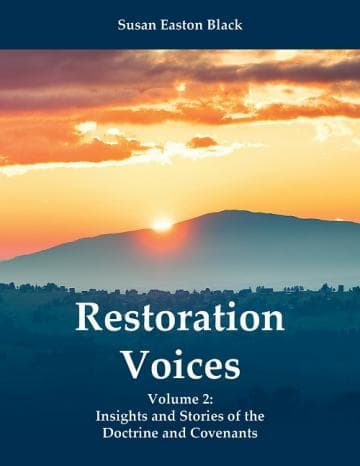Book
140 Chapters

The first meetings of the School of the Prophets were held in a small room in the upper floor of the N. K. Whitney and Company store in Kirtland, Ohio. Brigham Young recalled,
The brethren came to that place for hundreds of miles to attend school in a little room probably no larger than eleven by fourteen. When they assembled together in this room after breakfast, the first [thing] they did was to light their pipes and, while smoking, talk about the great things of the kingdom, and spit all over the room, and as soon as the pipe was out of their mouths a large chew of tobacco would then be taken. Often when the Prophet entered the room to give the school instructions he would find himself in a cloud of tobacco smoke. ... This made the Prophet think upon the matter, and he inquired of the Lord relating to the conduct of the Elders in using tobacco, and the revelation known as the Word of Wisdom was the result of his inquiry.[1]
In the Word of Wisdom, a health code for members of the Church, the Lord proclaims that fruits, grains, and wholesome herbs are to be consumed “with prudence and thanksgiving” and beasts and the fowls of the air “to be used sparingly” (D&C 89:11–12). The Lord further declares that alcohol, tobacco, and hot drinks are harmful to the body (vv. 5–9). The promises for living the Lord’s health code are increased health, wisdom, knowledge, and protection.
Although the promises given in the Word of Wisdom would prove a blessing to all Latter-day Saints, the general Church membership was slow to practice its truths. On September 9, 1851, about eighteen years after the revelation was received by Joseph Smith, Brigham Young proposed that all Latter-day Saints live the Word of Wisdom. His proposal was unanimously accepted as a binding commandment upon Church members.[2] Yet the general membership failed to keep the commandment.
Repeated admonitions by Church leaders met with varying degrees of acceptance. In 1913 President Joseph F. Smith explained, “The reason undoubtedly why the Word of Wisdom was given—as not by ‘commandment or restraint’ [sic] was that at that time, at least, if it had been given as a commandment, it would have brought every man addicted to the use of these noxious things under condemnation; so the Lord was merciful and gave them a chance to overcome, before he brought them under the law.”[3] At the October 1942 general conference, the First Presidency urged Latter-day Saints to “quit trifling with this law [the Word of Wisdom] and so to live it that we may claim its promises.”[4]
Elder David E. Sorensen of the Seventy in his April 2005 general conference address told of one blessing in his life for living the Word of Wisdom:
After boot camp and military police school, I found myself assigned to an army base to work as a military policeman. One night I was given an all-night assignment to escort a convoy of prisoners from one camp to another.
During the night the convoy stopped at a halfway point for a rest. The commanding officer instructed us to go into the restaurant and drink coffee so we could stay awake the rest of the night. Right away he noticed that I declined. He said, “Soldier, you need to drink some coffee to stay awake the rest of this trip. I do not want any prisoners escaping or causing trouble on my watch.”
I said, “Sir, I respectfully decline. I am a Mormon, and I don’t drink coffee.”
He didn’t care for my answer, and he again admonished me to drink the coffee.
Again, I politely refused. I took my place at the rear of the bus, my weapon in hand, praying in my heart that I would stay awake and never have to use it. The trip ended uneventfully.
A few days later the same commanding officer invited me into his office for a private interview. He told me that even though he had worried that I would not be able to stay awake during the all-night trip, he appreciated that I had stood by my convictions. Then to my amazement he said his assistant was being transferred and he was recommending me to be his new assistant!
For most of the next two years I had many opportunities for leadership and managerial assignments. As it turned out, the positive experiences during my military service were more than I had ever dreamed possible.[5]
[1] Brigham Young, “School of the Prophets,” Journal of Discourses, 12:158.
[2] Thomas Bullock, “Minutes of the General Conference,” Millennial Star 14, no. 3 (February 1, 1852), 35.
[3] Joseph F. Smith, “If I may indulge just a moment, ...” in Conference Report, October 1913, 14.
[4] Heber J. Grant, “Message of the First Presidency,” in Conference Report, October 1942, 7–17.
[5] Elder David E. Sorensen, “Faith is the Answer,” Ensign, May 2005.
Book
140 Chapters
Items in the BMC Archive are made publicly available for non-commercial, private use. Inclusion within the BMC Archive does not imply endorsement. Items do not represent the official views of The Church of Jesus Christ of Latter-day Saints or of Book of Mormon Central.